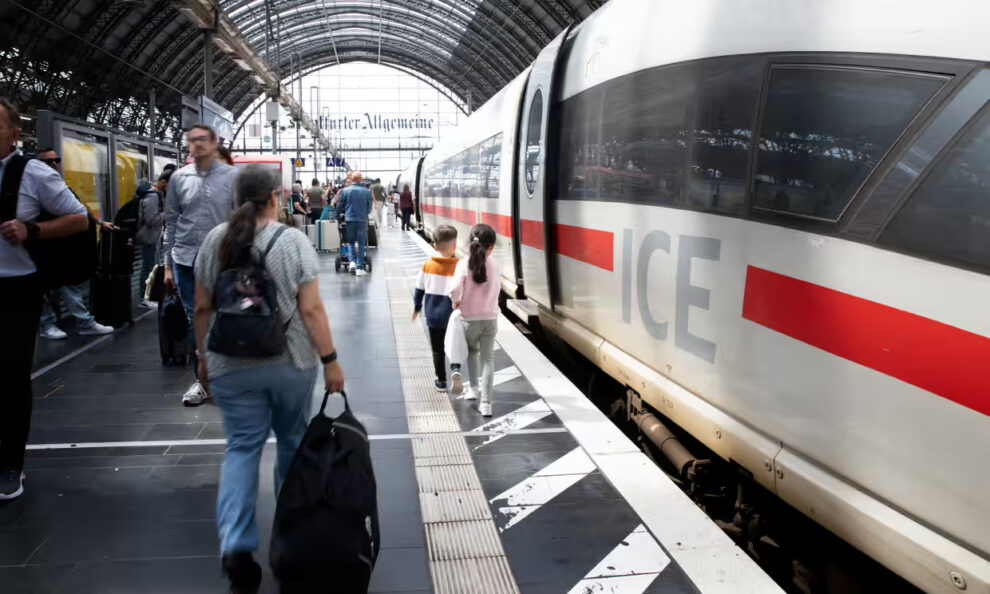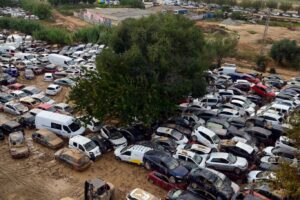Ihave never played in an orchestra. But when 200 musicians had to delay the start of a prestigious concert in Berlin recently because their train was late, I, along with many other longsuffering German rail travellers, reacted by thinking: “Typical, welcome to the club.”
The Munich Philharmonic was on tour and due to perform Mahler’s Second Symphony. It is a demanding piece for a large orchestra. Like many Germans these days, the orchestra prefers to travel by train for environmental reasons. In theory, it’s a sound decision. Germany is blessed with a splendid railway network and a fleet of intercity (ICE) high-speed trains. Deutsche Bahn, the state-owned German rail company, is so proud of running on green power that it makes a point of informing passengers that every ticket bought protects the climate.
The orchestra had booked to travel in the morning, which on arrival in Berlin, should have left the musicians enough time for a walk in the Tiergarten near the concert venue, the Berliner Philharmonie; a coffee in the Einstein cafe on Unter den Linden; or at the very least a bit of time to tune up before launching into the first movement. But at Cologne, their connecting train did not show, nor did the one after that, nor the next one either. The exhausted musicians arrived in the capital more than four hours after they had planned.
This is how it is today with German railways. According to its own statistics, this September only 58.4% of Deutsche Bahn’s long-distance trains ran on time. You need only enter a station to know things have gone badly wrong. There is a constant drone of Tannoy announcements; indeed this is the melody that now accompanies all rail travel in Germany. Even when your train isn’t mentioned as late or cancelled in the announcement, it doesn’t mean you are safe. Once there is a slight delay, the minutes begin adding up, as if any train can lose its slot on the overcrowded tracks and be forced to wait its turn in the system.
The cruellest journeys are those that start on time, which is not often the case on my Munich to Berlin ICE. My weekend frequently has to start early on Saturday morning rather than on Friday night. As a regular passenger you learn not to hope. But inevitably, you start out feeling optimistic. Then you look at the information display. A little delay. Come on, who minds two minutes? But the scheduled delay grows so that what starts off as an innocuous sliver of time becomes a missed appointment. This is when you wonder why they bother with train timetables at all.
So when the Munich Philharmonic failed to show up on time, no one was too surprised. We don’t even talk much about train delays any more. Only occasionally do you read about, say, the Swiss refusing to allow late-running German trains on to their network. Anyway, why talk about dreary delays, when it is so much more fun to discuss the excuses given by German rail; they have almost become a literary genre in their own right.
It might be a trace of Hegelian thinking or simply the influence of too much crisis communication training, but in Germany everything is fine as long as there’s an explanation for it. This is not only true of the railways. No affordable flats in Munich or Berlin? Well, this is why. Not enough teachers in our schools? Let me explain, they say, and then it doesn’t sound like a problem.
It does not always help that Deutsche Bahn thinks its announcements work best when delivered in a jaunty or slightly ironic tone, as staff explain delays, an absence of food in the buffet car (electricity issues), or drinks served in paper cups (broken dishwasher). Or the conductor might say: “Sorry for our late start, the reason is me.” The staff work on such a tight schedule that if one of their trains is delayed then they are late for their next journey, which then has a knock-on effect.
My favourite excuse is an expression that might one day be emblematic of contemporary Germany. I hear Deutsche Bahn wants staff to stop using it, but it can’t banish it from our minds. Verzögerungen im Betriebsablauf – “operational delays” – is meaningful and meaningless in a way that only the German language allows. One day it might even become one of those golden words co-opted into the English language – like zeitgeist or schadenfreude. (Let’s retire Blitz, a word that is jaded and overused in sport, politics and beyond.)
Verzögerungen im Betriebsablauf is the magic phrase for not getting anywhere fast while also suggesting everything is full steam ahead. It is sinister in a beautiful way. It is a phrase Kafka might use if he were writing today, a perfect description of a situation where no one can do anything but everyone is busy.
In this weird Kafkaesque world the passengers have become part of the machine, running from one platform to another because Deutsche Bahn switched them at the last minute. Carriages are then full of people discussing travel alternatives with their fellow commuters and, of course, because this is Germany, explaining why and when a system we once considered near-perfect, all went wrong.
One theory goes that the decline began in the mid-90s, when the government started its efforts to make Deutsche Bahn fit for sale. Another is that the politicians in charge simply didn’t care. In the 12 years to December 2021, all four ministers for transport came from the CSU, the Bavarian sister party of Angela Merkel’s Christian Democrats. Being from Bavaria, the BMW state, they were more interested in building new autobahns. What is not in dispute is that Germany has neglected Deutsche Bahn for too long and has underinvested in maintenance of the network.
So now, more and more Germans want to use the railways to be greener, but the infrastructure is a mess and the whole system chronically understaffed. Olaf Scholz’s coalition has recently announced plans to repair some mainline tracks and Deutsche Bahn is happy to spread the good news. Great, but then the delays and detours just multiply, at least temporarily, and slow us all down again.
And what about the Munich Philharmonic? Well, the orchestra made its 10-hour train odyssey public, apologising to the audience and for the radio broadcast that had to be cancelled on the night. It said how much it loved travelling by train and wanted to support Deutsche Bahn, but sounded a note of exasperation adding: “We can’t count on you. We can’t take it any more. When are you going to wake up?”
Reviews said how brilliant its performance of Mahler’s second had been and that the audience were entirely sympathetic. But Deutsche Bahn couldn’t resist replying, blaming bad weather for the delays. The orchestra shot back, saying the excuse it was given on the train was track maintenance. Why didn’t Deutsche Bahn just rely on the beautiful and indisputable: Verzögerungen im Betriebsablauf.
Source : The Guardian









